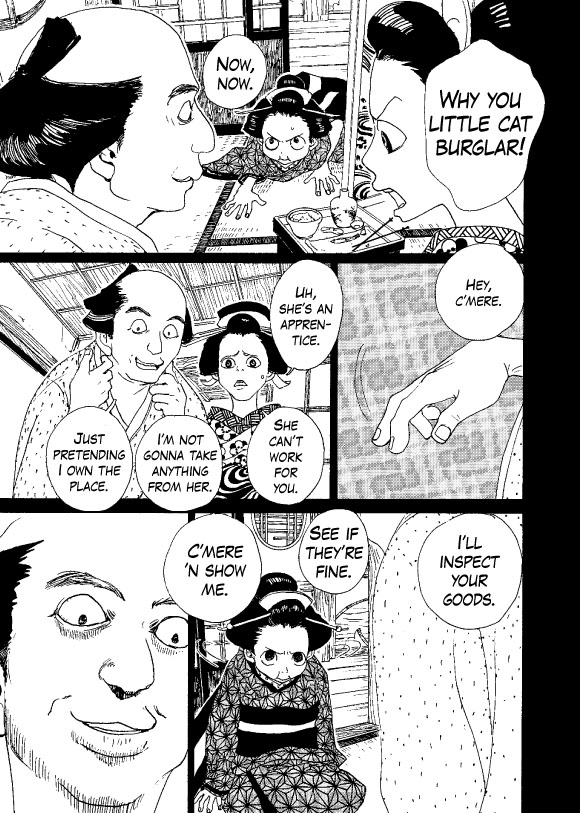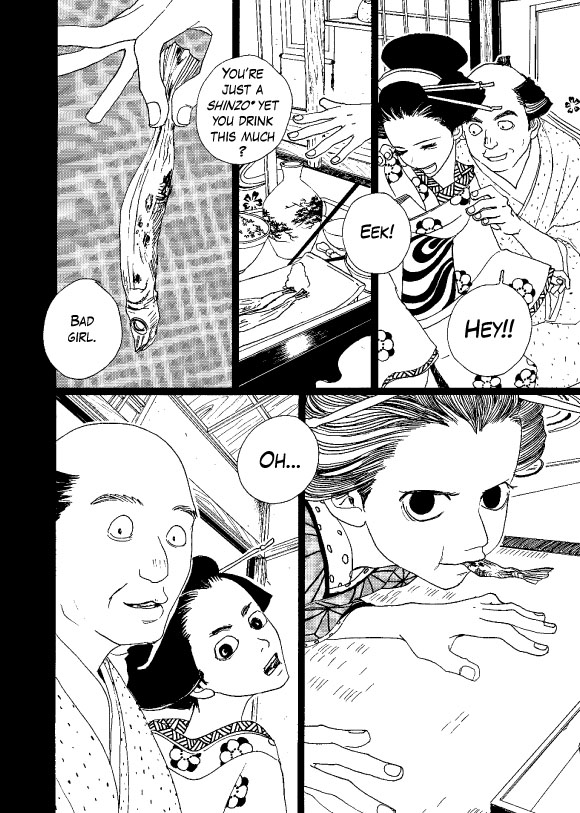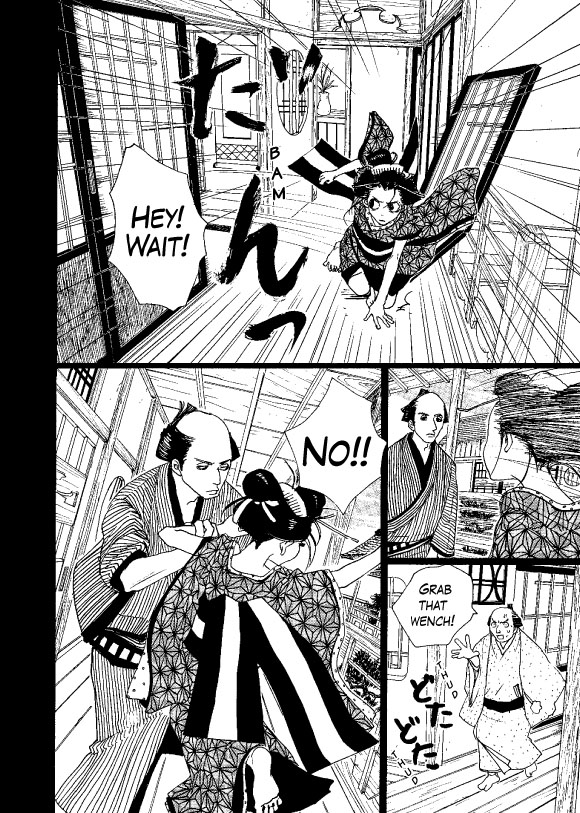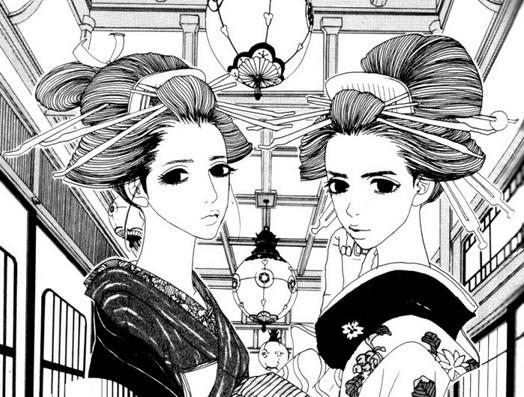 SEAN: It’s another tiny, tiny week at Midtown Comics, with only four titles to choose from. Given that, I will go with Sakuran from Vertical, Inc., despite it also appearing on this list two weeks ago. Comic readers who enjoy Love & Rockets type fare should give this book a try, though. It’s complete in one volume, contains some fantastic art, and has a strong plotline showing us someone who could easily use her looks and intelligence to rise to the top, and does—in spite of all her best efforts. It’s fascinating and raw, and probably the best Moyoco Anno title I’ve read to date.
SEAN: It’s another tiny, tiny week at Midtown Comics, with only four titles to choose from. Given that, I will go with Sakuran from Vertical, Inc., despite it also appearing on this list two weeks ago. Comic readers who enjoy Love & Rockets type fare should give this book a try, though. It’s complete in one volume, contains some fantastic art, and has a strong plotline showing us someone who could easily use her looks and intelligence to rise to the top, and does—in spite of all her best efforts. It’s fascinating and raw, and probably the best Moyoco Anno title I’ve read to date.
MJ: I’m with Sean. I’ve been eagerly anticipating Sakuran‘s release since Vertical announced it last fall, and it’s my must-read manga this week. I can hardly wait to pick this up.
MICHELLE: See above re; Sakuran!
 KATE: Since I’ve already plugged Sakuran both here and at my own site, I’ll make a pitch for the third volume of CLAMP’s X. One of the things I like best about the new VIZ 3-in-1 edition is the trim size. CLAMP’s gorgeous, swirling linework and epic battles finally have enough room to breathe, allowing readers to appreciate just how detailed (and gory!) it really is. I’m also enjoying the omnibus format; with an enormous cast and a profusion of subplots, X is the kind of story that’s best read in large installments. (I can’t keep track of the Seals and Dragons otherwise!) It’s frustrating to know that this series still doesn’t have a proper conclusion, but when the page-by-page journey is so engrossing, I almost don’t care.
KATE: Since I’ve already plugged Sakuran both here and at my own site, I’ll make a pitch for the third volume of CLAMP’s X. One of the things I like best about the new VIZ 3-in-1 edition is the trim size. CLAMP’s gorgeous, swirling linework and epic battles finally have enough room to breathe, allowing readers to appreciate just how detailed (and gory!) it really is. I’m also enjoying the omnibus format; with an enormous cast and a profusion of subplots, X is the kind of story that’s best read in large installments. (I can’t keep track of the Seals and Dragons otherwise!) It’s frustrating to know that this series still doesn’t have a proper conclusion, but when the page-by-page journey is so engrossing, I almost don’t care.
Readers, what looks good to you this week?





















 SEAN: It’s rare for me to recommend a manga purely on the basis of OH MY GOD IT’S SO ADORABLE, if only because there are so many other moe titles that ply on that trait that I dislike. Puyo’s alternate universe take on the 4th Haruhi Suzumiya novel, however, The Disappearance of Nagato-Yuki-chan is an exception. The artwork may not be perfect, especially at the start, but otherwise this is basically Haruhi reimagined as a cute romantic comedy starring Kyon and Yuki. (Don’t worry, Haruhi won’t stay away for long). Funny in a cute way, angsty in a cute way, and romantic in a very cute way, this is for everyone who thought that Haruhi’s story would be great if only everyone was simply nice to each other. And wait till you see Ryoko Asakura. (Of course, non-Haruhi fans likely won’t get the same value, but…)
SEAN: It’s rare for me to recommend a manga purely on the basis of OH MY GOD IT’S SO ADORABLE, if only because there are so many other moe titles that ply on that trait that I dislike. Puyo’s alternate universe take on the 4th Haruhi Suzumiya novel, however, The Disappearance of Nagato-Yuki-chan is an exception. The artwork may not be perfect, especially at the start, but otherwise this is basically Haruhi reimagined as a cute romantic comedy starring Kyon and Yuki. (Don’t worry, Haruhi won’t stay away for long). Funny in a cute way, angsty in a cute way, and romantic in a very cute way, this is for everyone who thought that Haruhi’s story would be great if only everyone was simply nice to each other. And wait till you see Ryoko Asakura. (Of course, non-Haruhi fans likely won’t get the same value, but…) MICHELLE: There are other worthy entries on this list, but I only have eyes for 13th Boy. As was my rationale with Ouran High School Host Club a few weeks ago, it’s impossible for me not to pick the final volume of a beloved series when it’s my last opportunity to do so. 13th Boy is easily one of the strongest, most interesting and surprising manhwa series to be released in America; if you’re at all curious about comics from Korea, you owe it to yourself to check it out.
MICHELLE: There are other worthy entries on this list, but I only have eyes for 13th Boy. As was my rationale with Ouran High School Host Club a few weeks ago, it’s impossible for me not to pick the final volume of a beloved series when it’s my last opportunity to do so. 13th Boy is easily one of the strongest, most interesting and surprising manhwa series to be released in America; if you’re at all curious about comics from Korea, you owe it to yourself to check it out.











 KATE: I only have eyes for one book this week: the long-awaited third volume of
KATE: I only have eyes for one book this week: the long-awaited third volume of  MICHELLE: I, too, am happy to see volume three of Summit of the Gods appear at long last, but I’ll throw a bit of love toward
MICHELLE: I, too, am happy to see volume three of Summit of the Gods appear at long last, but I’ll throw a bit of love toward  BRIGID: Summit of the Gods sounds pretty tasty, but it’s 95 degrees and I’m in the last stages of San Diego prep frenzy, so I need something light and amusing. I thought the first volume of
BRIGID: Summit of the Gods sounds pretty tasty, but it’s 95 degrees and I’m in the last stages of San Diego prep frenzy, so I need something light and amusing. I thought the first volume of  MJ: Aside from Summit of the Gods, this week is pretty light for me, so as I’m weighing in last, I’ll to head over to NETCOMICS and recommend their
MJ: Aside from Summit of the Gods, this week is pretty light for me, so as I’m weighing in last, I’ll to head over to NETCOMICS and recommend their